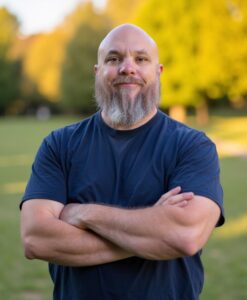 About David Falkirk
About David Falkirk
What kind of stories do you write? I tend to write speculative fiction that centers around the question of “What if ordinary people discovered they were capable of extraordinary things?” This fascinates me for two reasons:
I really do believe that most people, if pressed, can do things they never thought they could. We find out who we really are when we’re pushed to the wall. Many of my stories revolve around those who can do amazing things, but still have to navigate both the simple and complex challenges of life.
Also, I want to believe that the world is a much deeper place than we believe. I’m a hard-core realist who has trouble believing things that can’t be proven, but part of me desperately wants to believe that there are amazing things lurking just outside our vision, behind the next corner. What if there’s a world that exists just beyond the paper-thin membrane of our own?
How did you become a writer? I’ve been writing since high school, but honestly, I can track it back to Mr. Davenport’s ninth-grade English class (that class and the typing class I took in 11th grade are the two classes I still use every day). Davenport gave us an assignment to write a story, but the twist was that one student would write one page, give it to the next student, who’d write page 2, and so on. The story turned out to be an amazing mess, but it was fun. It showed me that writing and creativity could be pure joy. I’ve worked as a reporter for a daily newspaper, a trade magazine editor, and the publisher of an aerospace technical journal, but I’ve tried to keep that lesson from Mr. Davenport alive in everything I’ve done.
What are you working on now? I recently finished The EXOhuman Race, the first book in the APEX Initiative trilogy, along with two prequel novellas. I’m currently working on book two of the trilogy and have the entire series plotted out. I’m also developing some short stories and always have a few projects brewing. Writing is like a muscle — use it or lose it, and I believe in staying active.
Where do you get your ideas? By doing something that this society often tries to pound out of people as they get older: daydreaming. My inner monologue can get a little noisy at times (but no one can tell, because, well, it’s inner), but that’s where the ideas are forged. Some ideas don’t have legs on their own, but these remnants and scraps become parts of bigger stories. Other ideas are best left to bake for a while, and will come out when they are ready. Other times — and not often enough — ideas come almost fully formed and put me directly into the flow state.
The genesis of almost every story I’ve written, though, comes from answering some form of the question “What if?” The times I can put my body on auto-pilot — taking a walk, showering or that moment just before falling asleep — allow my mind to churn on the ideas, see how they play out and form a foundation to start from when I sit down in front of the blank page.
Favorite books/authors that influence you? It’s hard to narrow down, but one of my literary heroes is Richard Matheson. The scope of that man’s work honestly amazes me.
- I Am Legend (1954) — The vampire/zombie apocalypse classic that inspired countless films and books, and one day might actually be made as a great film in its own right, fingers crossed.
- The Shrinking Man (1956), which he then adapted for the 1957 film The Incredible Shrinking Man — You will never look at your cat the same way after watching this film.
- Bid Time Return (1975) —A time travel romance (before time-travel was cool), which was filmed as “Somewhere in Time.”
- What Dreams May Come (1978) — Afterlife/heaven exploration that became the 1998 film with Robin Williams. The film was a visual treat, and Robin was great in it, but the novel makes a case for an afterworld that I would actually like to find after death.
That’s not including the work he did on television. I knew he wrote the Twilight Zone classic “Nightmare at 20,000 Feet,” but I was shocked to find not that long ago that one of my favorite episodes of Star Trek, “The Enemy Within,” was written by, you guessed it…. Both episodes star William Shatner, as well, for what it’s worth.
Matheson had a career that spanned media, genre and generations. That’s a man who asked himself a lot of “What if?” questions.
Fun fact about myself? With my friends Ben Schneider and Paul Moeller (both amazing creatives in their own right — their band Digby has been a huge part of the soundtrack of my adult life), we set the Guinness World Record for The Longest Uninterrupted Live Webcast (41 hours) at the Wonderfest Convention in 2014. We had a podcast at the time, The Tower of Technobabble, and thought that the previous record of 39 hours could be broken — and we did. That record has since been broken, but I have the certificate on my wall to prove we were there. (We got the question, “What are you all going to talk about for that long?” quite a bit. The real question was, “How do you shut us up?”)
While we’ll let that record go to people who have more time on their hands, we still tinker with the idea of bringing that podcast back….
David Falkirk (1969-?) is an author, editor, photographer, graphic designer and recovering podcaster. He lives on a small farm in Indiana with his wife, Kristen, and their lab pup, Callie.
